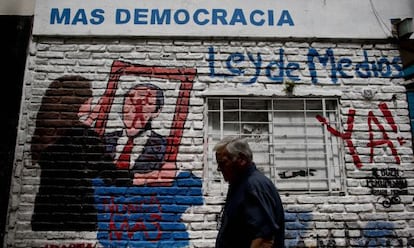Clarín may take ruling on Fernández’s media law to international courts
Argentinean justices side with government on divesting of broadcast licenses


One day after the Argentinean Supreme Court upheld a law designed to make media conglomerates sell some of their holdings, owners of the country’s largest communications company Grupo Clarín said Wednesday they will analyze whether to appeal the ruling at the international level.
As thousands celebrated the top court’s decision in front of Congress on Tuesday night, Argentina’s media giants remained divided over this controversial 2009 law, which the owner of Clarín newspaper claims is designed to punish newspapers and radio and television stations with opposing views to those of the government.
Supporters of President Cristina Fernández de Kirchner believe that opposition media outlets have been leading a campaign to destabilize her government. Some media investigations have suggested that her late husband, former President Néstor Kirchner, was involved in money laundering and committed other currency violations.
The Fernández de Kirchner-backed law, which has been challenged through the courts by Grupo Clarín’s lawyers since it was first approved, forces about 21 media companies to give up an estimated 330 communications licenses. Between 150 and 200 of these permits currently belong to Clarín.
Among the other groups affected are Telefónica, the US-run DirectTV and Prisa (publisher of EL PAÍS), which presented a plan that proposes to transfer various radio station licenses in different provinces and strengthen its position in the Radio Continental network in Buenos Aires.
The Supreme Court voted four to three to declare the law constitutional, with two of the dissenting justices saying that it should not be applied to Clarín while the other bench member rejected the law outright.
“The law as well as the decision, which ignores the ownership of current licenses [for radio and television and cable TV] which still have many years before they expire, openly violates the acquired-rights clause, which the three members of the Supreme Court recognized,” Group Clarín said in a statement.
Once a supporter of the Kirchners, Clarín turned its back on the presidential couple in 2008 during a contentious agriculture dispute in which Fernández de Kirchner tried to increase duties on grain exports — a position that she ultimately backed down from. “The best indication of the government’s real intentions is the massive official colonization of media since [the law was passed. Today, more than 80 percent of audio-visual media responds directly or indirectly to [the ruling coalition],” said Grupo Clarín, which has said it may appeal the ruling before the Inter-American Court of Justice and other international judicial bodies.
Clarín was the only media group that fought the law through appeals.
The Buenos Aires daily La Nación, which was critical of Néstor Kirchner after he took office in 2003, said in a column that “the media should not just become mere instruments of support for government policy or be used to eliminate dissenting voices. Writing in Página/12, which usually sides with the government, journalist Horacio Verbitsky predicted that Clarín would “resist as much as it can, and continue to oppose” the ruling. But Verbitsky celebrated the decision saying “there is no individual interest that can override public interest and laws that are passed in Congress must be followed.”
Tu suscripción se está usando en otro dispositivo
¿Quieres añadir otro usuario a tu suscripción?
Si continúas leyendo en este dispositivo, no se podrá leer en el otro.
FlechaTu suscripción se está usando en otro dispositivo y solo puedes acceder a EL PAÍS desde un dispositivo a la vez.
Si quieres compartir tu cuenta, cambia tu suscripción a la modalidad Premium, así podrás añadir otro usuario. Cada uno accederá con su propia cuenta de email, lo que os permitirá personalizar vuestra experiencia en EL PAÍS.
¿Tienes una suscripción de empresa? Accede aquí para contratar más cuentas.
En el caso de no saber quién está usando tu cuenta, te recomendamos cambiar tu contraseña aquí.
Si decides continuar compartiendo tu cuenta, este mensaje se mostrará en tu dispositivo y en el de la otra persona que está usando tu cuenta de forma indefinida, afectando a tu experiencia de lectura. Puedes consultar aquí los términos y condiciones de la suscripción digital.








































